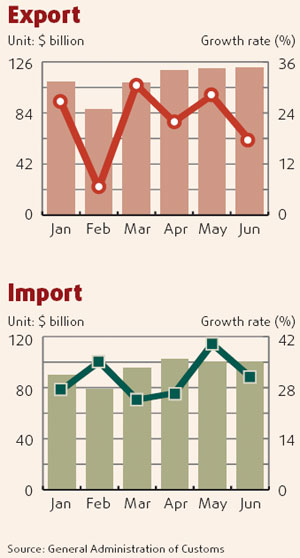Latest official figures show China's export growth slowed in June as a result of the shrinking demand caused by the global economic slowdown and the mounting pressure on Chinese manufacturers because of yuan appreciation and high raw material costs.
The Customs said on its website yesterday that the trade surplus in June fell by 20.6 percent to $21.35 billion. Exports for last month went up by 17.6 percent, much slower than the 28.1 percent rise in May.
Experts estimate the export slowdown may continue in the next half of the year, forcing the government to reconsider certain export-related policies.
Sun Mingshun from Lehman Brothers said the falling export growth is caused by the rising labor and raw material costs, and the government's tightening policies adopted since last year. On top of these, "the unfolding global economic slowdown is rubbing salt into the wound", said Sun, who estimates that export growth will continue to slow in the months to come.
Ma Xiaoping, an analyst with HSBC, said the figures would raise people's expectations on favorable government policies for export sectors. For instance, the textile industry has called for a rise in export tax rebate.
China has since last year lowered or even removed the export tax rebate of some products to curb the trade surplus. But some sectors are struggling as a result of a global slowdown, yuan appreciation and rising operating costs, hampering exports anyway.
Wang Jianhui, an analyst from Southwest Securities, said Chinese enterprises are still weak in deciding prices in the world market, but policy adjustments can only work well in the short term as the transfer of low-end manufacturing businesses is the trend.
The EU remains China's largest trade partner, followed by the US. The trade between China and India is increasing the fastest among China's major trading partners. The bilateral trade stands at $29 billion, up 69 percent.
The Customs figures also show the imports of primary goods increased fast, partly because commodities in the international market are getting more expensive.

(China Daily July 11, 2008)